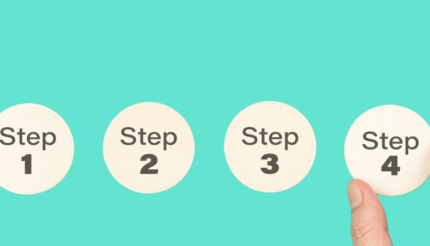What is an Identity iceberg and how does it help you build an identity? You’ve built your dream chart, listed your massive goals and set a time frame to make your dreams come true. So, how do you reach those goals that scare you and inspire people around you to dream as well?
To create results, you need to define who you are. “I am” are the two magic words that help you build your identity. When you know yourself, you can become the person you want to be in order to have what you wish for.
To illustrate how the words “I am” influence your journey to success, Brad Sugars, ActionCOACH founder and CEO, uses a metaphor: the Identity Iceberg.
The Identity Iceberg
As you know, only 10% of an iceberg is above the waterline; the rest remains hidden below. The same is true for humans: you see a small percentage of the characteristics that define a person and there are skills and beliefs that remain unknown.
Here’s what an identity iceberg looks like:
- Above the waterline, your behaviours – your decisions and actions.
- Below the waterline, lie your skills, beliefs, values, and core identity.
- The water that surrounds the iceberg is the environment in which you live and work.
Few people are aware that the decisions they make and the actions they take come from what’s below the waterline. Your choices are determined by the rest of the elements, based on the law of cause and effect. So, if you want to change your behaviours, you need to switch what causes the decisions that leads to your actions.
Defining Your Core Identity
Each of the elements under the waterline of the identity iceberg contributes to turning you into a successful person.
Your Skills
People tend to dedicate more time to the things they’re good at. If you want to make a change on the surface and be successful in a specific business area, you need to acquire new skills. You can join a class, or an advanced learning program, become a member in a club where you can learn more about what you’re interested in. The more knowledge and experience you gain, the more of it you will do, as a result of having achieved new skill sets.
Your Beliefs
What you believe to be true more often will become true. That’s why changing beliefs is challenging; it’s the area where people need to counter the self-fulfilling prophecy.
Furthermore, sometimes people continue to think they’re not good at something, even when they get great results. They attribute their success to luck or an error instead of becoming aware of their abilities.
Every time you reinforce a belief, you add a rock to the pile. Next time you say, “I’m going to be good at…,” try to switch it to “I can be good at…” You can take some classes to learn new skills, instead of deciding you’re not good enough.
Your Values
The values in the identity iceberg refer to how you prioritise the various things in your life. For example, success can be more valuable than fear of rejection. In this case, you don’t care how many times you hear “No” and continue with your plan until you reach your goals. Others value acceptance more than success, so they’d rather not be successful if that means not having to handle any rejection.
Values contribute to your beliefs. So, if you want to change what you believe about yourself, you need to analyse your values first and determine what matters the most to you.
Your Core Identity
Your core identity is what determines the values on which you build your beliefs, which influence the skills you develop. It’s formed by your “I am” statements – your definition of yourself.
The identity is wrapped up in jobs, family situations, educational background. When you’re reactive and let circumstances or other people define who you are, you downplay you. How do you make a shift at this deep level? You need to think of who you need to be to have what you want. You must try to become who you want to be, by making it an “I am” statement. Just as external circumstances can shift your core identity, you can do it too.
And, when your brain acknowledges the new “I am” statement, everything changes. Your values shift, your beliefs alter, and you’re forced to learn new skills that align with them. As a result, your decisions change and generate different behaviours.
Building Your Identity
The most significant factor that generates your identity is the environment: your family, your friends, the people you work with, your company, the places where you spend your free time. Each one of these environments impacts your core identity.
If you change things in your home or office, go to different restaurants, or meet new people, you can shift your “I am” statements. If you’re always in unfavourable environments, surrounded by negative people, you support your negative identity.
Positivity arrives when you work in a company that supports your growth, and you socialise with positive people, who encourage you. The water shapes the iceberg in the same way, the environment shapes who you are.
What’s Next?
If you want to change your behaviours, you need to start working on the elements of the identity iceberg that lay under the waterline.
Analyse your habits and identify three places you need to stop going to reduce your negative identity. Then, find three environments where you need to be, so you can shift your core identity.
Personal development will help you grow, and your “I am” statements change with time. You need to be proactive and participate in making the change possible. You might make mistakes along this journey to become a successful person. But it doesn’t mean you’ve failed. The only failure is the failure to participate. Every fail is an opportunity to learn.
Life is all about learning experiences. It’s not about success and failure, but about success and learning. Either you succeed, or you discover a new way of doing things. The only way you fail is by doing nothing.
If you would like to find out more, sign up for a free coaching session where I can tell you more about the formula for life success, or join my private Facebook Group, The Business Garden, where you will learn to work on the elements below the waterline.
What was once a small office in downtown Toronto-Canada
This will let you evaluate your writing requirements with other kinds of word essay writing services
This shows you just what type of work the authors are generating, so that you know that writers are capable of creating the very best
This could help you get affordable-papers.net the additional papers from the way.
research papers.
before you decide on which one you would like to employ.
is now a world-leading online manufacturer serving pupils in the USA, Canada, UK, Australia and worldwide.






Comments